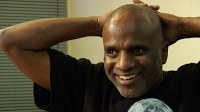
Neurotypical is an unprecedented exploration of autism from the point of view of autistic people themselves. Four-year-old Violet, teenaged Nicholas and adult Paula occupy different positions on the autism spectrum, but they are all at pivotal moments in their lives. How they and the people around them work out their perceptual and behavioral differences becomes a remarkable reflection of the “neurotypical” world—the world of the non-autistic—revealing inventive adaptations on each side and an emerging critique of both what it means to be normal and what it means to be human.
Adam Larsen’s Neurotypical has its national broadcast premiere on Monday, July 29, 2013, at 10 p.m. (check local listings), as part of the 26th season of the award-winning PBS series POV (Point of View). The film streams on POV’s website, www.pbs.org/pov/neurotypical, from July 30-Aug. 29.
Neurotypical, filmed predominately in North Carolina and Virginia, introduces viewers to:
Wolf, an African American autism advocate, who declares, “I look at neurotypical life and I’m sorry, I really don’t want to be one of you.” He’s perfectly happy without physical intimacy because of his extreme sensitivity to touch.
Violet, age 4, who is unable to communicate her desires clearly. When she’s feeling good, her energy is limitless. Her parents look for ways to make her life happy and fulfilling. But they wrestle with questions most parents never have to ask: Will the label of autism limit their daughter’s potential? Should they begin going down the road of medicating her or not?
Nicholas, age 14, who might seem the typical American teen, complete with skateboard, guitar and video games. But he struggles with feelings of alienation that go beyond the usual teenage angst.
Adult Paula, who was diagnosed with autism as an adult after she read an article on the subject. Enlightened by this self-awareness, she begins to assess her life through a new lens and finds a community of new friends.
Maddi, a senior in high school who wants a relationship. “Just because Temple Grandin doesn’t do it, doesn’t mean it doesn’t happen,” she says, referring to perhaps the most famous individual with autism.
Thirty-something John, who reveals two simple ways he’s learned to follow conversations: Say someone’s name as often as possible, because “a person’s own name is their favorite word in the whole wide world,” and repeat the last three or four words of whatever the person says. “It works like magic.”
These stories raise the film’s central questions. Just what is “normal” for the human mind? Should the many and varied aspects of autism be considered signs of dysfunction or insights into a broader understanding of what it is to be human? Neurotypical is a revelatory portrait of a not-uncommon and little-understood state of being that questions the fundamentals of human perception.
“Neurotypical originated in the shared experiences of my family and the autistic community in western North Carolina,” says filmmaker Adam Larsen. “I began to feel a growing rebellion against what I saw as society’s double standard—either a pervasive need to make people into a rendition of something ‘normal,’ or a tendency to sensationalize the extremes of autism. Making Neurotypical provided a wonderful opportunity to explore more fully the richness of humanity and to bring the concept of neurodiversity into the mainstream.”








